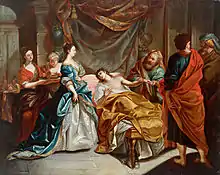Lovesickness
Lovesickness refers to an affliction that can produce negative feelings when deeply in love, during the absence of a loved one or when love is unrequited. It has been considered a condition since the Middle Ages and symptoms that have remained consistent across time include a loss of appetite and insomnia.[1]
| Part of a series on |
| Love |
|---|
Red-outline heart icon |
The term "lovesickness" is rarely used in medical or psychological fields but new research is being undertaken on the impact of heartbreak on the body and mind.[2]
History
Love can be seen as an emotion that brings happiness into people's lives. Therefore, lovesickness is the complete opposite and the symptoms are not to be neglected. Throughout the Middle Ages , ancient medicine did not know a lot about this mental illness.[3] Moreover , it was not always called lovesickness from the start. This mental illness was firstly associated with melancholia which is a mental illness that creates a deep depression within people . Doctors could not tell the difference between those two (lovesickness and melancholia) , it was viewed as if it was the exact same thing.[3] Aretaeus of Cappadocia ( XIX century) , who was a known doctor during the Middle Ages era,[4] at first only believed that lovesickness was just a depressive phase that some people can experience from lack of love , yet still called this mental illness being melancholia[3] .One day he met a man who's "melancholia" was the cause of an heartbreak , Aretaeus described the man condition a "serious dejection due to unrequited love".[3] The man who was experiencing this feeling had to follow a treatment that another doctor suggested in order for him to heal. Due to the fact that doctors only viewed what he was experiencing as melancholia , the treatment did not work on him , which is how Aretaeus found out that lovesickness dissociates from melancholia and that is it a real thing.[3]
Indeed , this roman doctor,[5] Caelius Aurelianus viewed lovesickness as something that is just like melancholia because it feels approximately the same way . It causes symptoms such as stress, anxiety , insomnia, depression and feeling of unhappiness,etc.[3] But what made him perceive it from a different angle is the fact that he then found out that lovesickness can also cause within someone a lot of anger ,hate and fear and it is a disease that needs to be treated.[3]

Love as mental illness
Literature and poetry have often described love as a kind of madness, and the medical profession takes a similar approach. According to the Hippocratic Medicine view, passionate love will almost always fade or turn into "love melancholy" — this is a form of depression or sadness.[6] Passionate love is the love in the "honeymoon phase", the beginning of new love, but it burns itself out after a year or two, compassionate love is what occurs after passionate love fades, it is a stronger bond of companionship.[7] In both cases, lovesickness can be experienced if love is lost or unrequited.

Love sickness is not just an expression but has been studied as an actual illness. In 1915, Sigmund Freud asked rhetorically, "Isn't what we mean by 'falling in love' a kind of sickness and craziness, an illusion, a blindness to what the loved person is really like".[8]
Scientific study on the topic of lovesickness has found that those in love experience a kind of high similar to that caused by illicit drugs such as cocaine. In the brain, certain neurotransmitters — phenethylamine, dopamine, norepinephrine and oxytocin — elicit the feeling of high from "love" or "falling in love" using twelve different regions of the brain. These neurotransmitters mimic the feeling of amphetamines.[9]
On average a psychologist does not get referrals from general practitioners mentioning "lovesickness", although this can be prevalent through the language of what the patient feels. With the common symptoms of lovesickness being related to other mental diseases, it is often misdiagnosed or it is found that with all the illnesses one could be facing, love is the underlying problem.[10] This is incredibly dangerous when one does not seek help or cannot cope because love has been known to be fatal (a consequence of which might be attempted suicide, thus dramatising the ancient contention that love can be fatal).[11]
In his book The Social Nature of Mental Illness, Len Bowers (Professor, Emeritus; King's College, London) postulates that although physiological differences exist in the brain of those that are deemed "mentally ill," there are several other criteria that must be met before the differences can be called a malfunction. It is possible, therefore, that many mental illnesses (such as lovesickness), will never bear strong enough evidence to clinically warrant 'legitimate' affliction by clinical-standards; without further, correspondingly parasympatric, criterions of established dysfunction(s).
Symptoms
When people are affected by the illness of lovesickness the effects reach not only their heart and soul but it also reach their body.[12] Symptoms such as insomnia , not eating enough and nausea are one of them.[12] They can also appear to start to have a paler skin tone , be more distracted than usually,[12] they can cry a lot and are constantly worried.[12] People that experience this depressing path mostly see love as something that is extremely toxic for them, something that takes happiness away.[12] People that suffer from this do not want to experience love again because it tortures them morally and physically.[12]
Frank Tallis, a researcher in the topic of love and lovesickness, suggests in his 2005 article that lovesickness occurs when one is "truly, madly, deeply" in love and should be taken more seriously by medical professionals.[11] Similarly, health experts agree that lovesickness has been known to kill and the diagnosis process should be taken more seriously.[13] Symptoms of lovesickness are usually misdiagnosed for various other diseases or mental health issues such as OCD, this is because love sickness is less commonly recognized as a mental health issue in itself.
Tallis includes a list of common symptoms of love sickness:
- Mania - an abnormally elevated mood or inflated self-esteem
- Depression, hopelessness, or helplessness
- Nausea
- Tearfulness
- Insomnia, which may lead to fatigue
- Lack of concentration
- Loss of appetite or overeating
- Stress - high blood pressure, pain in chest and heart, acute insomnia; sometimes brought on by a "crush"
- Obsessive-Compulsive disorder - Preoccupation and hoarding valueless but superstitiously resonant items
- Psychologically created physical symptoms, such as upset stomach, change in appetite, insomnia, dizziness, and confusion
- Chronic neck pain, body tremors, intrusive thoughts, frequent flashbacks.
- Rapid mood swings
According to Tallis, many symptoms of being lovesick can be categorized under the DSM-IV (Diagnostic and Statistical Manual of Mental Disorders) and the ICD-10 (International Classification of Diseases). Obsessive-Compulsive disorder (OCD) is a symptom of lovesickness because it includes a preoccupation, this would include constantly checking one's cellphone, Facebook, the hoarding of valueless items, etc.[11] A further study conducted by Italian Psychiatrist Donatella Marazitti found that when people fall in love their estimated serotonin levels drop to levels found in patients with OCD, this level is significantly lower than that of an average or healthy person.[14]
In the arts
William Shakespeare's Romeo and Juliet portrays the true madness of "love" and the grief that the two young, infatuated lovers feel.[15] When Romeo finds his love dead (or so he believes), with the thought of living without his "true love", the grief and depression overcomes him and he takes his own life. Juliet, after waking and upon seeing his dead body is also overcome with despair and takes her own life.
Gothic metal songs thematize lovesickness from Medieval literary influences. "This emotional and physical distress is a key element of fin'amor that echoes into Gothic metal", according to The Oxford Handbook of Music and Medievalism. "In particular, lovesickness was associated with desires and passions that remained unfulfilled, resulting in symptoms such as sleeplessness, sighing, and loss of appetite, all of which were considered manifestations of the mind's efforts to restrain its passions."[16]
The lyrics to American R&B singer Bilal's song "Something to Hold on To" (from the album Love for Sale) are described as a plea to romantic devotion hastily written in a moment of lovesickness.[17]
See also
- Affectional bond
- Broken heart
- Hi-wa itck, a Mojave Indian syndrome triggered by separation of a loved one
- Limerence
- Lovestruck
References
- Williams, Laura Kalas. "Being lovesick was a real disease in the Middle Ages". The Conversation. Retrieved 2020-02-25.
- "Love, Actually: The science behind lust, attraction, and companionship". Science in the News. 2017-02-14. Retrieved 2020-02-25.
- Toohey, Peter (1992). Love, Lovesickness, and Melancholia. University of Illinois Press. pp. 265–86.
- "Aretaeus Of Cappadocia | Greek physician". Encyclopedia Britannica. Retrieved 2020-12-14.
- "Caelius Aurelianus | Greco-Roman physician". Encyclopedia Britannica. Retrieved 2020-12-14.
- Tallis, Frank. "Is Love a Mental Illness?". Archived from the original on 12 September 2017. Retrieved 26 March 2014.
- Whitbourne, Susan K. "What is the Passion in Passionate Love?". Psychology Today. Retrieved 29 March 2014.
- Janet Malcolm, Psychoanalysis: The Impossible Profession (1988) p. 9
- Vaughn, Tricia. "Love sickness is real, and the high it provides looks a lot like cocaine usage". Article. The Crimson White. Archived from the original on 7 April 2014. Retrieved 28 March 2014.
- Tallis, Frank (2004). Love Sick: Love as a Mental Illness (Second ed.). Da Capo Press.
- Tallis, F (2005). "Truly, madly deeply in love" (PDF). The Psychologist. 18 (2): 72–4. Archived from the original (PDF) on 2012-05-05. Retrieved 2014-04-02.
- Popova, Maria (2016-03-09). "The Causes and Cures of Lovesickness: A 17th-Century Guide to the Woes of the Heart". Brain Pickings. Retrieved 2020-12-14.
- "British study say: Unrequited love can be a 'killer'". BBC. 2 April 2014. Retrieved 28 March 2014.
- Marazziti D, Akiskal HS, Rossi A, Cassano GB (May 1999). "Alteration of the platelet serotonin transporter in romantic love". Psychol Med. 29 (3): 741–5. doi:10.1017/S0033291798007946. PMID 10405096.
- Shakespeare, William. Romeo and Juliet.
- Yri, Kirsten; Meyer, Stephen C., eds. (2020). "Medievalistic Melancholia and Lovesickness". The Oxford Handbook of Music and Medievalism. Oxford University Press. p. 552. ISBN 9780190658465.
- Godfrey, Sarah (January 29, 2007). "By Grace of MySpace: No New Album, but Bilal Packs Black Cat". The Washington Post. Retrieved July 20, 2020.
Further reading
- Tallis, Frank (2005). Love Sick: Love as a Mental Illness.
- Vaughn, Tricia (2013). "Love sickness is real, and the high it provides looks a lot like cocaine usage".
- Bowers, Len (2000). The social nature of mental illness. London: Routledge. ISBN 0415227771.
- King, Helen (2008). "The Secret Wound: Love, Melancholy and Early Modern Romance (review)". Bulletin of the History of Medicine. 82 (2): 445–446. doi:10.1353/bhm.0.0009. S2CID 71371213.